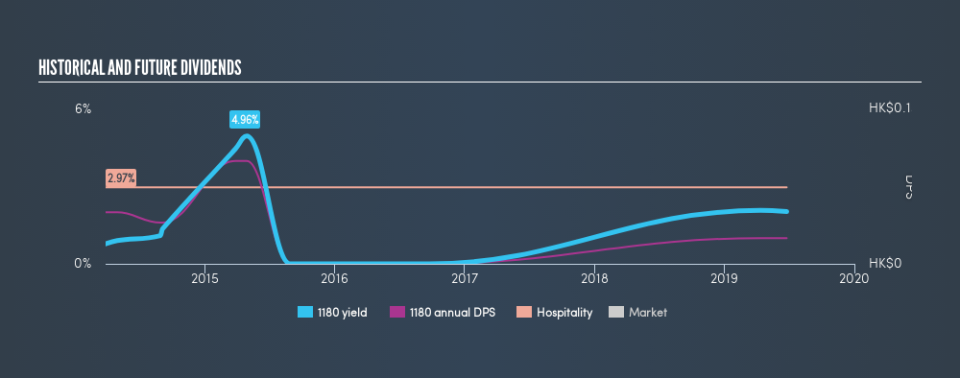What To Know Before Buying Paradise Entertainment Limited (HKG:1180) For Its Dividend

Want to participate in a short research study? Help shape the future of investing tools and you could win a $250 gift card!
Is Paradise Entertainment Limited (HKG:1180) a good dividend stock? How would you know? Dividend paying companies with growing earnings can be highly rewarding in the long term. Yet sometimes, investors buy a popular dividend stock because of its yield, and then lose money if the company's dividend doesn't live up to expectations.
Investors might not know much about Paradise Entertainment's dividend prospects, even though it has been paying dividends for the last five years and offers a 2.0% yield. While the yield may not look too great, the relatively long payment history is interesting. Some simple analysis can reduce the risk of holding Paradise Entertainment for its dividend, and we'll focus on the most important aspects below.
Click the interactive chart for our full dividend analysis
Payout ratios
Dividends are typically paid from company earnings. If a company pays more in dividends than it earned, then the dividend might become unsustainable - hardly an ideal situation. As a result, we should always investigate whether a company can afford its dividend, measured as a percentage of a company's net income after tax. In the last year, Paradise Entertainment paid out 45% of its profit as dividends. This is medium payout level that leaves enough capital in the business to fund opportunities that might arise, while also rewarding shareholders. Plus, there is room to increase the payout ratio over time.
We update our data on Paradise Entertainment every 24 hours, so you can always get our latest analysis of its financial health, here.
Dividend Volatility
From the perspective of an income investor who wants to earn dividends for many years, there is not much point buying a stock if its dividend is regularly cut or is not reliable. Looking at the data, we can see that Paradise Entertainment has been paying a dividend for the past five years. During the past five-year period, the first annual payment was HK$0.05 in 2014, compared to HK$0.025 last year. Dividend payments have fallen sharply, down 50% over that time.
A shrinking dividend over a five-year period is not ideal, and we'd be concerned about investing in a dividend stock that lacks a solid record of growing dividends per share.
Dividend Growth Potential
Given that dividend payments have been shrinking like a glacier in a warming world, we need to check if there are some bright spots on the horizon. It's not great to see that Paradise Entertainment's have fallen at approximately 18% over the past five years. If earnings continue to decline, the dividend may come under pressure. Every investor should make an assessment of whether the company is taking steps to stabilise the situation.
Conclusion
When we look at a dividend stock, we need to form a judgement on whether the dividend will grow, if the company is able to maintain it in a wide range of economic circumstances, and if the dividend payout is sustainable. First, we like that the company's dividend payments appear well covered, although the retained capital also needs to be effectively reinvested. Earnings per share are down, and Paradise Entertainment's dividend has been cut at least once in the past, which is disappointing. In sum, we find it hard to get excited about Paradise Entertainment from a dividend perspective. It's not that we think it's a bad business; just that there are other companies that perform better on these criteria.
Are management backing themselves to deliver performance? Check their shareholdings in Paradise Entertainment in our latest insider ownership analysis.
We have also put together a list of global stocks with a market capitalisation above $1bn and yielding more 3%.
We aim to bring you long-term focused research analysis driven by fundamental data. Note that our analysis may not factor in the latest price-sensitive company announcements or qualitative material.
If you spot an error that warrants correction, please contact the editor at editorial-team@simplywallst.com. This article by Simply Wall St is general in nature. It does not constitute a recommendation to buy or sell any stock, and does not take account of your objectives, or your financial situation. Simply Wall St has no position in the stocks mentioned. Thank you for reading.

 Yahoo Finance
Yahoo Finance 
